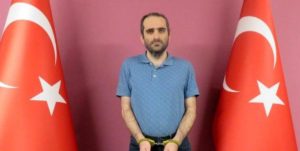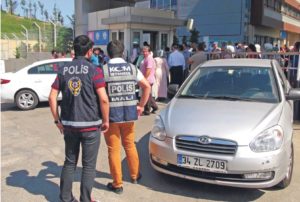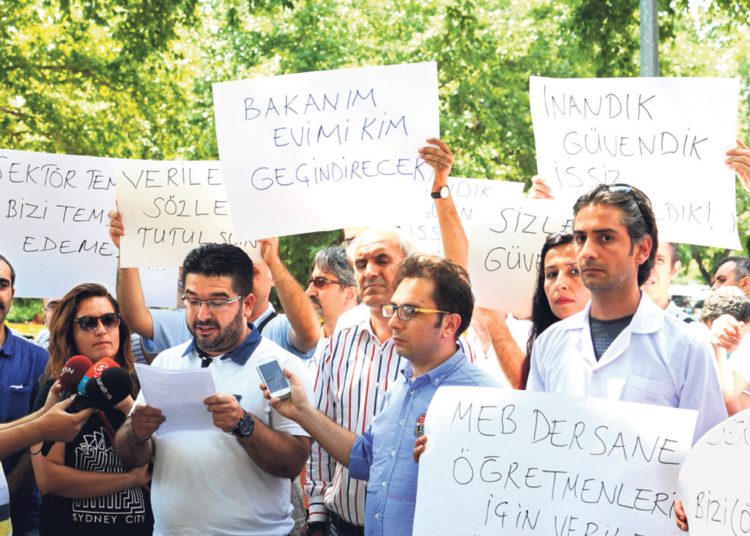Abdullah Bozkurt/Stockholm
Turkey’s notorious intelligence agency MIT abducted a teacher from Kenya to interrogate him about his membership in a teachers union that was established by critics of the Islamist government of President Recep Tayyip Erdoğan.
According to the interrogation report, classified as secret by the investigating prosecutor and obtained by Nordic Monitor, Selahaddin Gülen, 30-year-old teacher, was asked why he became a member of the Pak Education and Science Employees Union (Pak Eğitim-İş) when he was in Turkey.
Selahaddin, a US resident who took a teaching job in Kenya, is a nephew of President Erdoğan’s arch foe Fethullah Gülen, and his kidnapping in Kenya and imprisonment in Turkey are part of campaign of intimidation waged by the Erdoğan government to punish critics, opponents and dissidents. Dozens of Fethullah Gülen’s relatives were jailed in Turkey on what appear to be dubious charges and sham evidence.
Selahaddin’s membership in the teachers union was listed as criminal evidence sufficient to warrant his false imprisonment although the union was duly authorized and licensed to operate by the government at the time. In fact, the Education Ministry had sent an official letter to 26 governor’s offices and provincial education directorates advising them to freely promote the union among public and private schools.
Part of Selahaddin Gülen’s statement taken by police in Turkey:
It was shut down in 2016 by the Erdoğan government along with 15 other unions, and the union leaders, its employees and members have been facing malicious prosecutions since then. Many union members were indicted and convicted when the government said it would retroactively consider any affiliation with the union to be evidence of terrorism.
The Turkish government’s criminalization of union membership was criticized by observers as an open violation of Turkey’s constitution as well as its international obligations under the International Covenant on Civil and Political Rights (ICCPR), the European Convention on Human Rights (ECHR), the International Covenant on Economic, Social, and Cultural Rights (ICESCR) and provisions of the International Labour Organization (ILO) Convention.
Pak Eğitim-İş was involved in nationwide protests against the Erdoğan government when a bill was introduced to shut down prep schools that would have put around 50,000 or 60,000 education workers at risk of losing their jobs overnight. The bill, pushed through parliament by the government in March 2014, was later annulled by the Constitutional Court. The government did not enforce the ruling and moved forward with its closure plans.
The union sued the government and filed criminal complaints against key government officials who were involved in unlawful conduct in enforcing actions that, union lawyers claimed, amounted to a violation of the Turkish constitution. The union was planning to take the case to the European Court of Human Rights (ECtHR) for violating educational rights and for not implementing the top court’s ruling. However, in July 2016 the government used a false flag coup attempt as a pretext for shutting down the union, which was deemed to be opposed to the Erdoğan government’s policies. The union’s legal challenges were thwarted when its leaders and their lawyers were imprisoned on bogus charges.

“We found the opportunity to do many things under the state of emergency that we could not do at other times,’ President Erdoğan said in September 2016 after his government shut down nearly 200 media outlets and thousands of associations, foundations, schools, unions and professional organizations under the pretext of the fight against terrorism. According to official government data, over half a million people have been the subject of legal action since 2016, and tens of thousands of them have been arrested and jailed.
Elements of the government of President Uhuru Kenyatta in Kenya were believed to have aided and abetted the Turkish intelligence agency’s abduction of Selahaddin despite the rulings of Kenan courts that barred Kenyan authorities from handing him over to the Turkish government. Human Rights Watch said it would send a letter to the Kenyan government demanding an explanation of the abduction, while Selahaddin’s lawyer Jotham Arwa has been seeking answers in urgent court filings.
During his interrogation, Selahaddin was also asked about a fundraising charity campaign run by an NGO in the United Kingdom to help refugees stranded in Greece where Turkish critics, especially Gülen movement participants, have sought political asylum from repression in Turkey. The UK charity, Time to Help, organized a march to raise awareness of refugees from Turkey and collect funds through online fund-raising charity Totalgiving.co.uk.
Part of Selahaddin Gülen’s statement taken by police in Turkey:
The Turkish government apparently obtained a list of donors from the site and launched criminal proceedings against them. Selahaddin’s email address was also on the list, and he was questioned about that as well.
The crackdown on the Gülen movement, a group that is opposed to the Erdoğan government, has become more brutal since the corruption investigations of December 17-25, 2013, which implicated then-Prime Minister Erdoğan, his family members and his inner circle.
A total of 292,000 people affiliated with the movement have been detained while 96,000 others have been jailed in the last five years according to a figure announced by Interior Minister Süleyman Soylu in September 2020.
According to statistics issued by the Council of Europe (CoE), as of January 2020 out of 30,524 prisoners convicted on terrorism charges in the 47 CoE member states, 29,827 were in Turkey. In other words, 98 percent of all inmates convicted of terrorism in all of Europe are resident in Turkey. It shows how the government abuses its counterterrorism laws to punish critics, opponents and dissidents in this country of 84 million that is suffering under the iron grip of President Erdoğan.

The assets of thousands of people with alleged ties to the Gülen movement were also confiscated or frozen by the government. According to a report by Brussels-based human rights group Platform for Peace and Justice (PPJ), the total value of confiscated or frozen assets is $32 billion.
Critics of the Erdoğan government abroad, especially members of the movement, have also been facing surveillance, harassment, death threats and abduction since President Erdoğan decided to scapegoat the group for his own legal troubles.
In a joint letter UN rapporteurs accused the Turkish government of engaging in the systematic practice of state-sponsored extraterritorial abductions and forcible returns to Turkey, with at least 100 Turkish nationals from multiple states including Afghanistan, Albania, Azerbaijan, Afghanistan, Cambodia, Gabon, Kosovo, Kazakhstan, Lebanon and Pakistan removed to Turkey.
In a number of cases the UN Working Group on Arbitrary Detention (WGAD) concluded that the arrest, detention and forced transfer to Turkey of Turkish nationals were arbitrary and in violation of international human rights norms and standards.












